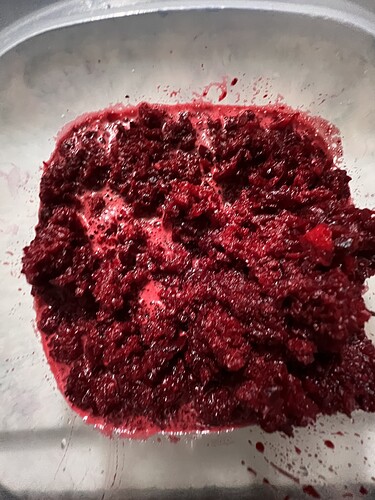We don’t know enough about abiogenesis to be able to say ID is a convincing argument or not, so all your statement really amounts to is argument from incredulity. I suspect that if we ever figure out how life started it will work as an argument from elegance, but arguments from incredulity are just lazy.
How could the alleged first organism exist if it wasn’t irreducible complex?
At least, so goes the story. What is your proof that evolution gave flies facet eyes and wings?
It is definitely gross indeed. But even if it’s an outdoor space and not overcrowded and the pigs are happy. It still ends in their death just because someone likes the taste of their skin and muscles. Death can’t be avoided, but it can be reduced. Science has shown that we can indeed live off of plants, mushrooms and bacteria without eating animals. In places like America, it really comes down to just this.
- Choosing animal life over your tastebuds.
- Being willing to step outside of a comfort zone to learn how to cook new meals.
- Being ok to go with what’s more in season to meet budgetary needs instead of just wanting exotics.
Cotton candy grapes are more expensive than moon grapes and moon grapes are more expensive than seediness green grapes and those are more expensive than red grapes with seeds. There is also the healthcare benefits. Diets that are unhealthy often means spending more time at hospitals and missing more days at work.
I often tell people instead of just going old turkey and becoming full blown vegan what if you just decide Friday dinner and Saturday morning is plant based or if you make Monday a meatless Monday. That way you can continue to eat how you typically do, and get more daring on just a few meals. Let one Friday dinner be vegan burgers like impossible and maybe the following Friday you try to make your own vegan burger.
I make them with beets often.
You can try to stretch meat out further in a meal. Like make your typical beef or turkey burger but mix it half and half with beans and rice. So the patty is 1/2 meat and 1/2 beans and rice. Lots of nice plant based and mushroom based cookbooks out there.
At this moment, I have a project to keep mealworms healthy. These mealworms are farmed to replace pigs, cattle and chicken for meat in the future.
I’ll still be eating just plants and mushrooms like I have for close to the last 15 years.
We don’t know. That’s why scientists of all faiths and none keep researching.
I like telling people about how those in ancient times did it: meat was for feast days, not for ordinary consumption. If you count Sundays as feast days, that’s about six dozen days of the year eating meat. For most people I know that would be 75% to 80% reduction in meat consumption.
Though you’re right about people switching all at once; it took me a couple of years to achieve it. The quickest I’ve seen anyone make the change was a couple who decided to give up meat for Lent: since Sundays aren’t part of Lent, that meant meat one day a week. They stuck to it, and when Lent was over they kept it up both because they felt healthier and because the drop in their grocery bill was noticeable.
These days I really only buy meat when I have a coupon or it’s on sale; I probably have a meal with meet three times a month.
My switch was kind of fast too. When I was around 13/14 I begin to be way more influenced by vegetarianism. When I was around 17 I left and went backpacking ( though mostly hopping on trains ) from Alabama to NJ and then through the Midwest and ended up in the southwest and then even went a few hundred miles south into Mexico. During this time like 95% of the food I ate was from farm crops. Though we also met a veteran who gave us dozens and dozens of MRIs. The trip only lasted a few months. So it was not bad. A few times I did randomize jobs. But almost everything was from crops and so it was all vegetables and fruits. During this time I was considering a fully plant based diet and just fell into it for a few reasons. A few times someone’s made me food uncertain what my diet was and made it with milk and eggs and I still ate it out of politeness. I can’t wait to have a new house though with a nicer kitchen so I feel like I have more space to work in. Right now I cook off of two burners and so it also erases some of my desire to cook to much. I’ve never been into grilling but I think I’m going to begin experimenting with how to grill all these different plants and mushrooms and foods this winter.
I read about someone doing the same with crickets. It seems bizarre to me, though I suppose all the exoskeleton bits would count as dietary fiber.
Makes you wonder how that would affect us. A quick google shows that chitin stimulates the immune system, and may have some allergic and inflammatory effects, so a bunch in the diet might have some bad effects. However, we eat shrimp and lobsters, so crickets are not that far away. I just remember having outbreaks of crickets on occasion, and the odor of the mass of dead and dying crickets was awful. Tough to get past that, would much rather have a crunchy grasshopper.
There seems to be uncertainty about whether humans can digest chitin or not. We (or at least most of us) do secrete an enzyme that breaks it down, but whether we do so enough to effectively digest it or not isn’t clear in the little reading I did on the subject. (I find it interesting that it’s the immune response that seems to trigger the production of the chitinase in the stomach, at least in mice. I didn’t know that was a possible mechanism.) I do see that omnivores (pigs, chickens) tend to produce functionally useful amounts of chitinase while carnivores and herbivores don’t, and humans are pretty omnivorous.
I’ve eaten crickets, by the way – fried, in a salad. They were fine.
I also saw that it is beneficial against some cancers.
I read that same thing and was like, “Whoa! Immune systems can change things in the stomach??”
The only time I’ve eaten cricket was when I was maybe five years old, and I got smacked down hard for it (which might explain why I can’t even make myself pick one up).
“An alleged process that is allegedly be explained by mindless, aimless, natural mechanisms represents the Fingerprint of God? How did you work that out? That’s like claiming the evaporation of water represents the Fingerprint of God.”
The Bible affirms that “natural” mechanisms are God’s handiwork. Genesis 1 assures us that natural processes do not have minds or aims of their own, unlike in pagan belief, but are simply parts of God’s creation. Thus, all scientific models are indeed efforts at describing the fingerprints of God, whether the evaporation of water, evolution, or anything else.
Thus, the ID assertion that we are made either by God or by mindless molecular processes is quite bad theology. Your most recent meal is being made into you by countless molecular processes, and none of those molecules has a mind. Slightly longer term, the process of development that built you from a single cell to your present structure also is built of countless molecular processes.
Of course, natural processes such as gravity or evolution do not have a printed label; it is the eye of faith that discerns God’s fingerprints everywhere. We don’t always see how they point to God. Ogden Nash wrote that “God in His wisdom made the fly, And then forgot to tell us why.” But an entomologist might perceive great wonder in the diversity of dipterans and their ecological roles. Different people will be more appreciative of different aspects of creation; we can trust that God does have a purpose in the aspects that we can’t figure out.
When thinking of this metaphore, it came up in my mind that both TE and ID paint a target around the bullet hole. The difference is that ID paints a very small target and states that it’s not possible to have this situation by chance and TE paints a huge target and states that probability is not a problem.
To a certain extent, both are guessing about the size of the target. But it’s also unclear how many possible targets there might be.
There must have existed a cut-off point between life and non-life, so I think one could argue that the first (alleged) organism must have been irreducibly complex.
Scientists will never discover that cut-off point. Abiogenesis science amounts to chasing fairies at the bottom of the garden.
There must have existed a cut-off point between life and non-life, so I think one could argue that the first (alleged) organism must have been irreducibly complex.
Well, I find this is always an interesting question–is a virus or a prion truly, obviously life?
If not, as most think, then what is the cutoff?
Thanks.
A cut-off point may be drawn when there is a continuum; it does not prove irreducible complexity. Currently we know that it is possible to have somewhat simpler versions of bacteria than what currently exist, and we know that complicated organic chemical systems can be built up from scratch. In between those is a sizeable gap with a bunch of big question marks. I do not think that it is wise to claim, as much ID does, that the gap definitely cannot be filled using natural-law type processes. My guess, given the general pattern of God using natural law-style processes in governing creation, is that He did use natural law-type patterns for that process as well. I don’t know whether we will be able to completely replicate the process in the lab. I doubt that enough detail is preserved in the fossil record to show exactly how it happened, rather than “probably fairly similar to what we did in lab”, even if stepwise building of life from abiotic components was achieved in lab. But someone else might reasonably say that “I don’t know for sure, either, but it looks more unlikely to me.”



